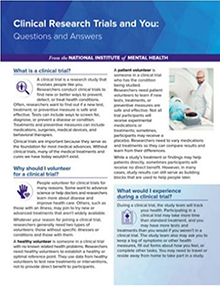Clinical Trials – Information for Participants
What are clinical trials?
Clinical trials are research studies that look at ways to prevent, detect, or treat diseases and conditions. They are critical to understanding and treating mental illnesses. Clinical trials are the primary way researchers determine if a new treatment is safe and effective in people.
Clinical trials can study:
- New drugs or combinations of drugs.
- New medical procedures (such as a new blood test or scan).
- New medical devices (such as a brain stimulation device).
- New therapies or behavioral interventions, which help people change their behaviors, thoughts, and feelings to improve their mental health
- New ways to prevent health conditions or find a disease early, sometimes even before symptoms occur.
Watch these videos to learn more about clinical trials
Unless otherwise specified, the information on our website and in our publications is in the public domain and may be reused or copied without permission. However, you may not reuse or copy images. Please cite the National Institute of Mental Health as the source. Read our copyright policy to learn more about our guidelines for reusing NIMH content.

